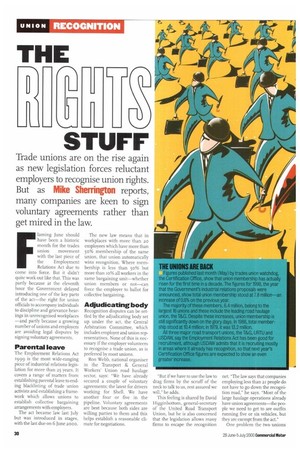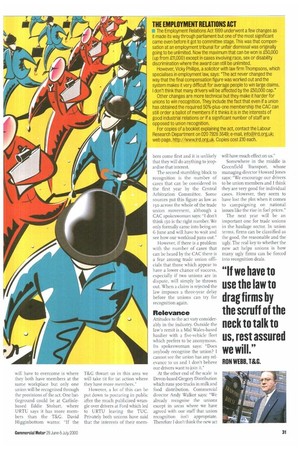STUFF
Page 32

Page 33

If you've noticed an error in this article please click here to report it so we can fix it.
Trade unions are on the rise again as new legislation forces reluctant employers to recognise union rights. But as Mike Sherrington reports, many companies are keen to sign voluntary agreements rather than get mired in the law.
IF, laming June should have been a historic month for the trades union movement with the last piece of
the Employment Relations Act due to come into force. But it didn't quite work out like that. This was partly because at the eleventh hour the Government delayed introducing one of the key parts of the act—the right for union officials to accompany individuals to discipline and grievance hearings in unrecognised workplaces —and partly because a growing number of unions and employers are avoiding legal disputes by signing voluntary agreements.
Parental leave
The Employment Relations Act 1999 is the most wide-ranging piece of industrial relations legislation for more than 25 years. It covers a range of matters from establishing parental leave to ending blacklisting of trade union activists and establishing a framework which allows unions to establish collective bargaining arrangements with employers.
The act became law last July but was introduced in stages, with the last due on 6 June z000.
The new law means that in workplaces with more than 20 employees which have more than 5o% membership of the same union, that union automatically wins recognition. Where membership is less than 50% but more than io% all workers in the same bargaining unit—whether union members or not—can force the employer to ballot for collective bargaining.
Acripinhcadng body
Recognition disputes can be settled by the adjudicating body set up under the act, the Central Arbitration Committee, which includes employer and union representatives. None of this is necessary if the employer volunteers to recognise a trade union, as is preferred by most unions.
Ron Webb, national organiser in the Transport & General Workers' Union road haulage sector, says: "We have already secured a couple of voluntary agreements; the latest for drivers working for Shell. We have another four or five in the pipeline. Voluntary agreements are best because both sides are willing parties to them and this helps establish a reasonable climate for negotiations. "But if we have to use the law to drag firms by the scruff of the neck to talk to us, rest assured we will," he adds.
This feeling is shared by David Higginbottom, general-secretary of the United Road Transport Union, but he is also concerned that the legislation allows many firms to escape the recognition net. "The law says that companies employing less than 21 people do not have to go down the recognition road," he says. "Most of the large haulage operations already have union agreements—the people we need to get to are outfits running five or six vehicles, but they are exempt from the act."
One problem the two unions
will have to overcome is where they both have members at the same workplace but only one union will be recognised through the provisions of the act. One battleground could be at Carlislebased Eddie Stobart, where URTU says it has more members than the VEG. David Higginbottom warns: "If the T8E.G thwart us in this area we will take tit for tat action where they have more members."
However, a lot of this can be put down to posturing in public after the much publicised wrangle over drivers at Ford which led to URTU leaving the TUC. Privately both unions have said that the interests of their mem
bers come first and it is unlikely that they will do anything to jeopardise that interest.
The second stumbling block to recognition is the number of cases that can be considered in the first year by the Central Arbitration Committee, Some sources put this figure as low as 150 across the whole of the trade union movement, although a CAC spokeswoman says: "I don't think 150 is the right number. We only formally came into being on 6 June and will have to wait and see how our workload pans out."
However, if there is a problem with the number of cases that can be heard by the CAC there is a fear among trade union officials that those which appear to have a lower chance of success, especially if two unions are in dispute, will simply be thrown out. When a claim is rejected the law imposes a three-year delay before the unions can try for recognition again.
Relevance
Attitudes to the act vary considerably in the industry. Outside the law's remit is a Mid Wales-based haulier with a five-vehicle fleet which prefers to be anonymous. Its spokeswoman says: "Does anybody recognise the union? I cannot see the union has any relevance to us and I don't believe our drivers want to join it."
At the other end of the scale is Devon-based Gregory Distribution which rims 300 trucks in milk and food distribution. Commercial director Andy Walker says: "We already recognise the unions except in areas where we have agreed with our staff that union recognition isn't appropriate. Therefore I don't think the new act
will have much effect on us."
Somewhere in the middle is Greenfield Transport, whose managing director Howard Jones says: "We encourage our drivers to be union members and I think they are very good for individual cases. However, they seem to have lost the plot when it comes to campaigning on national issues like the rise in fuel prices,"
The next year will be an important one for trade unions in the haulage sector. In union terms, firms can be classified as the good, the reasonable and the ugly. The real key to whether the new act helps unions is how many ugly firms can be forced into recognition deals.












































































































